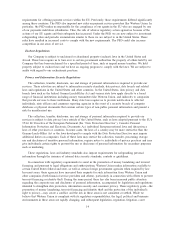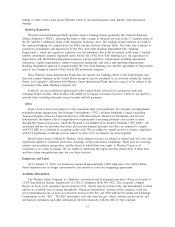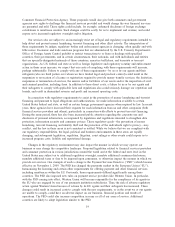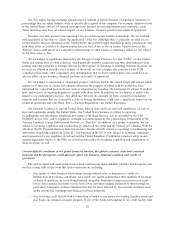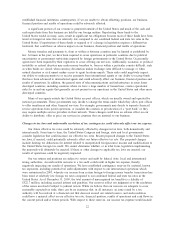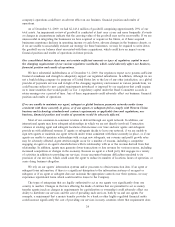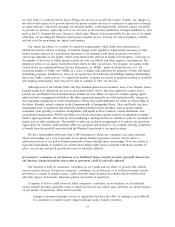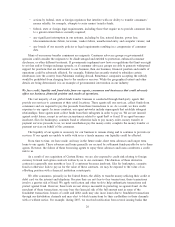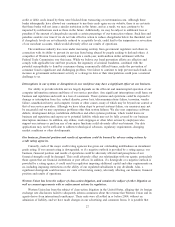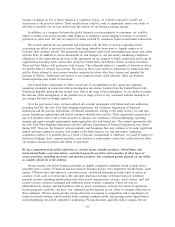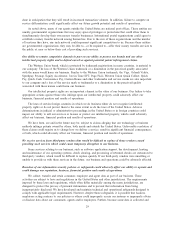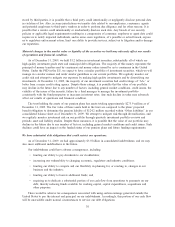Western Union 2009 Annual Report Download - page 37
Download and view the complete annual report
Please find page 37 of the 2009 Western Union annual report below. You can navigate through the pages in the report by either clicking on the pages listed below, or by using the keyword search tool below to find specific information within the annual report.(i) any changes in tax reserves arising from material changes during the period in the facts and circumstances
(i.e. new information) surrounding a tax issue, and (ii) any difference from the Company’s tax position as
recorded in the financial statements and the final resolution of a tax issue during the period. Such resolution
could materially increase or decrease income tax expense in our consolidated financial statements in future
periods and could impact our operating cash flows.
The Internal Revenue Service (“IRS”) completed its examination of the United States federal
consolidated income tax returns of First Data Corporation (“First Data”) for 2003 and 2004, of which Western
Union was a part, and issued a Notice of Deficiency in December 2008. The Notice of Deficiency alleges
significant additional taxes, interest and penalties owed with respect to a variety of adjustments involving us
and our subsidiaries, and we generally have responsibility for taxes associated with these potential Company-
related adjustments under the tax allocation agreement with First Data executed at the time of the Spin-off.
We agree with a number of the adjustments in the Notice of Deficiency; however, we do not agree with the
Notice of Deficiency regarding several substantial adjustments representing total alleged additional tax and
penalties due of approximately $114 million. As of December 31, 2009, interest on the alleged amounts due
for unagreed adjustments would be approximately $30 million. A substantial part of the alleged amounts due
for these unagreed adjustments relates to our international restructuring, which took effect in the fourth quarter
2003, and, accordingly, the alleged amounts due related to such restructuring largely are attributable to 2004.
On March 20, 2009, we filed a petition in the United States Tax Court contesting those adjustments with
which we do not agree. We believe our overall reserves are adequate, including those associated with the
adjustments alleged in the Notice of Deficiency. If the IRS’ position in the Notice of Deficiency is sustained,
our tax provision related to 2003 and later years would materially increase, which could materially impact our
financial position, results of operations and cash flows. See Note 10 to our consolidated financial statements
for a further discussion of this matter.
Acquisitions and integration of new businesses create risks and may affect operating results.
We occasionally acquire businesses both inside and outside the United States. The acquisition and
integration of businesses involve a number of risks. The core risks involve valuation (negotiating a fair price
for the business based on inherently limited due diligence) and integration (managing the complex process of
integrating the acquired company’s people, products and services, technology and other assets in an effort to
realize the projected value of the acquired company and the projected synergies of the acquisition). In
addition, the need in some cases to improve regulatory compliance standards is another risk associated with
acquiring companies. International acquisitions often involve additional or increased risks including, for
example:
• managing geographically separated organizations, systems and facilities;
• integrating personnel with diverse business backgrounds and organizational cultures;
• integrating the acquired technologies into our company;
• realization of anticipated financial benefits from these acquisitions and where necessary, improving
internal controls of these acquired businesses;
• complying with regulatory requirements;
• fluctuations in currency exchange rates;
• enforcement of intellectual property rights in some foreign countries;
• difficulty entering new markets with the services of the acquired business; and
• general economic and political conditions, including legal and other barriers to cross-border
investment in general, or by United States companies in particular.
Integrating operations could cause an interruption of, or divert resources from, one or more of our
businesses and could result in the loss of key personnel. The diversion of management’s attention and any
delays or difficulties encountered in connection with an acquisition and the integration of the acquired
23



